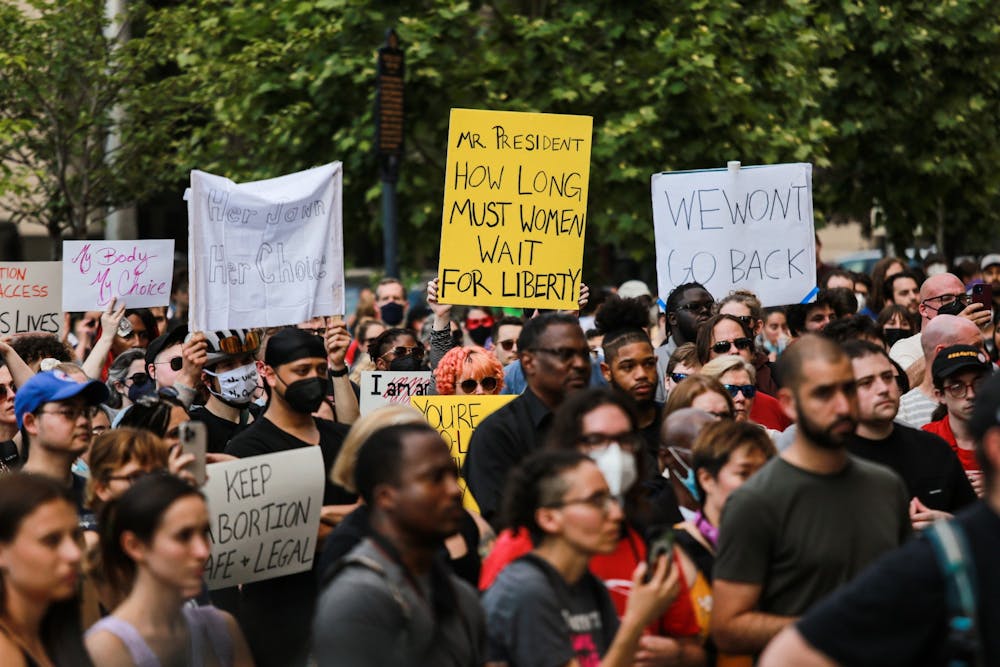
Women everywhere should be deeply saddened by the Supreme Court overturning Roe v. Wade in a 6-3 decision, but this decision disproportionately affects women from low-income communities and women of color.
Coming from Mississippi, I’m part of a community where this decision carries particularly brutal implications. The overturning of Roe v. Wade originates from the Dobbs v. Jackson Women's Health Organization case in which Mississippi’s Gestational Age Act, limiting abortion past 15 weeks, was challenged by the state’s only abortion clinic and one of its doctors. The clinic claimed that the act violated the protection established by Roe v. Wade—the specific protection of the Fourteenth Amendment of the U.S. Constitution, which established that individual privacy includes the right to abortion. The Supreme Court has now established that these protections no longer exist.
Mississippi is one of the thirteen states that have an automatic trigger law that immediately bans all abortions. Because abortion access is now restricted in Mississippi and surrounding states, the ability to travel for an abortion will likely become a socioeconomic barrier to low-income women who cannot afford to travel far distances, obtain adequate health care, or financially support a newborn.
Governor of Mississippi Tate Reeves expressed immense pride in the decision by posting, “Joyful day! And the result of decades of work and prayer by pro-life Americans! To God be all the glory!!” on his social media.
It is sadistic that Reeves would claim that is a “joyful day” considering how over 26.6 million American women are currently living in states where abortion is likely to be banned or severely restricted. His comments are especially cruel to a certain demographic of constituents, Mississippian women of color, who will be adversely affected by these conservative efforts to integrate religion into shaping public policy. Reeves is well aware that he is leading a state that struggles significantly from legacies of slavery and Jim Crow. Mississippi is the "poorest and blackest" state in the nation, also with the highest teen pregnancy rate and highest child poverty rate in the nation.
To further compound the far-reaching effects of this decision, nationally, Black women are over three times more likely to die in pregnancy and postpartum than white women. This statistic is not only a result of a lack of access to adequate health care, it is also the result of attempts to perform unsafe abortions. The difference in maternal mortality is alarming enough but even more so now that more women will be forced to carry to term.
The Supreme Court justices who voted in favor of this decision, along with many conservative politicians and legislators, have successfully illustrated that they do not concern themselves with protecting the lives of the most vulnerable. Overturning Roe v. Wade will only put the most at-risk women in an eternally compromising position.
The pressures of socioeconomic inequalities, the legacy of discrimination, the miserly health care system, and the loss of access to abortion in Mississippi to women and women of color is an extreme example of how women’s livelihoods are always at stake; however, this decision will be detrimental to women everywhere. Millions of women will lose the right to make informed decisions about their bodies and their futures, a life-altering position to be forced into by the State. Our current political landscape is so disheartening, as our divisiveness has clouded any memory of a once strong and unified country that worked to ameliorate the lives of those who were most at risk.
As former anti-abortion U.S. Representative Ted Yoho once said, “The American dream comes from opportunity. The opportunity comes from our founding principles, our core values that’s held together and protected by the Constitution. Those ideas are neither Republican, Democrat, conservative, liberal, white, or black. Those are American ideologies.” How rich the irony is that the very ideals Yoho supports are at odds with the above description of the American Dream.
What happened to this collective, non-divisive vision of the American Dream, of American ideologies? Over 60% of Americans believe that abortion should be legal, a unified majority. Overturning Roe v. Wade illustrates that the American Dream is a thing of the past for women, and especially for women of color.
It is easy to dismiss and neglect those who have been excluded from important conversations about women’s rights in our national political landscape. That being said, vote civically-minded. As young people at Penn, an institution with a high concentration of privilege, we have more power than we realize in shaping the future for women. Remember who we should work to protect, and be intentional about who you choose to support. At the end of the day, choosing the right candidate will save women’s lives and livelihoods.
ALLISON SANTA-CRUZ is a rising College sophomore studying communications from Jackson, Miss. Her email address is allisant@sas.upenn.edu.
The Daily Pennsylvanian is an independent, student-run newspaper. Please consider making a donation to support the coverage that shapes the University. Your generosity ensures a future of strong journalism at Penn.
Donate




